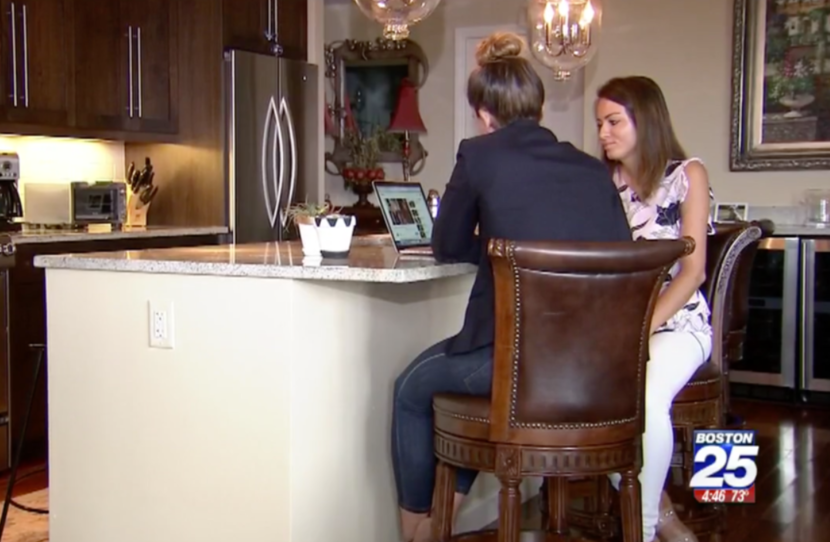Lexi Pappas and her Mom Both Have Muscular Dystrophy. This is Their Story.

Photo: Lexi Pappas Sitting with Fox25Boston. Source: Lexi's Blog "Living with FSHD." URL: https://livingwithfshd.wordpress.com/2018/01/05/2017-year-in-review/
Facioscapulohumeral dystrophy (FSHD) is a much more rare variant of muscular dystrophy, which consists of an autosomal dominant inherited version of muscular dystrophy, that begins by affecting the muscles in the face, and then makes its way towards the scapula, and upper arms. This variant is the third most common type of muscular dystrophy, just behind Duchenne muscular dystrophy and Becker muscular dystrophy.
In stark contrast to Duchenne, FSHD can manifest in both genders and has a reported incidence of 4 cases per 100,000 inhabitants. Symptoms of muscle weakness inherent with this variant usually manifest early in the patient’s childhood, and seldom go unnoticed past 20 years of age; that is to say, around 95 percent of cases are usually identified and diagnosed at or before the patient’s twentieth birthday.
Besides the face, scapula, and upper arms, those affected with FSHD may eventually begin showing signs of muscle weakness in other parts of the body. In some cases, the patient’s life expectancy may be compromised if the disease targets his or her respiratory muscles. According to studies, around 20 percent of the cases of FSHD end up severely disabled, often requiring the use of wheelchairs or motorized scooters in order to get around.
Like most types of muscular dystrophy, FSHD is also caused by a genetic anomaly, specifically associated with errors in Chromosome 4 of the human genome. The chromosome has fewer copies of an integral 3.2kb unit named D4Z4. Healthy patients show about 11 to 150 repetitions of the unit, while those at risk of developing FSHD usually possess a fewer number of said units.
Those who are at risk of suffering from the disease are also prone to passing the genetic defect down to their offspring, which is what happened to mother and daughter, Diane and Lexi Pappas, as they both suffer from FSHD from an early age.
For a long time, Lexi had hidden her disease from friends and family due to the shame of not being able to perform the tasks she, at some point, could achieve with ease. As the disease seized control of her facial muscles, as well as those in her upper arms, she began frequently falling down, becoming unable to bend over, and even lost the ability to perform her favorite hobbies, which included rock climbing.
As the young adult became increasingly familiar with her disease, she decided to open up about her condition to the world and, in 2014, Lexi went public about her disease by starting a blog. However, on June 20, 2016, just two short years after her opening up to the public, she decided to take things one step further by coming out to her friends via a public Facebook post.
In commemoration of World FSHD, Lexi seized the opportunity to let every one of her acquaintances, friends, and loved ones know about her condition. The news was received with shock, considering that this form of muscular dystrophy can seldom be identified by a simple glance, or by observing her in pictures. The teen went on to elaborate how the disease had affected her, and how she could no longer perform the activities that she was once able to.
For someone who took great shame in how her disease had significantly restricted her lifestyle, Lexi commented on how freeing her revelation had been for her and remarked on how ‘coming out’ had helped to lift a metaphorical weight off her shoulders. Furthermore, her plight had also helped to raise awareness for the FSH Society, a group that advocates for American FSHD patients, and which is based in Lexington, just outside of Boston, and a short 45-minute drive from Gloucester where Lexi and her mother, Diane, live.
Like Lexi, Diane has also struggled with FSHD for a great part of her life. Her father had also suffered from the disease. Diane manifested symptoms as early as her high school years, back when she was a senior in 1981. Diane’s elder brother, who is 6 years older than the Massachusetts woman, is also afflicted with the disease; though his symptoms are much milder than both his sister’s and niece’s. That being said, it’s fair to say that this family is by no means a stranger to FSHD, though this fact seldom makes it any easier for them to deal with it.
On the bright side, Diane states that though her condition, she can understand precisely what her daughter is going through, and is more than qualified to lend any emotional support that she may require. Furthermore, their disease has allowed them to create an emotional bond where they can support each other when the going gets rough.
Diane is thankful that she has the disease so that her daughter does not have to face it alone. Moving on, she also commented that, as her mother didn’t share her disease, and since she had a gender barrier between her dad and herself, she barely did have someone to support her through her issues with her self-esteem, body image, and clothing.
Fortunately, advances in medical technology have granted Lexi with certain boons that her family could not have before. In 2015, Lexi underwent scapula surgery in both her right and left shoulders, which ensured, according to her, that she would not lose her ability to ‘lift her hand to her face’ (to eat and drink), an advantage that her grandfather sadly did not have access to.
Another difficulty experienced by Lexi stems from the lordosis caused by her muscular dystrophy, which gives her the appearance of looking like she is pregnant. Lexi says that she has to constantly deal with awkward pregnancy questions on a near daily basis, which only contributes towards her declining self-image issues. Parking in handicapped spots is another source of dismay, as most people can’t tell by sight alone that she suffers from a debilitating disease.
Luckily, her blog has helped both to raise awareness about her disease and to help find a source of support where at one time there had been none. Lexi is amazed to receive such positive feedback on her blog, and a constant flow of emails asking her about her condition as well. She says that, mostly, people want to know about her surgeries and how these have helped her to adjust to her disease. Others are simply content to read the topics that she published on a regular basis.
Lexi is a Bryant University marketing graduate, a degree she earned early last year in 2017. She currently works as an associate producer and editor for the television team of the computer company, Dell.
To learn more about Lexi Pappas and the rest of her family, check out her blog at https://livingwithfshd.wordpress.com/














